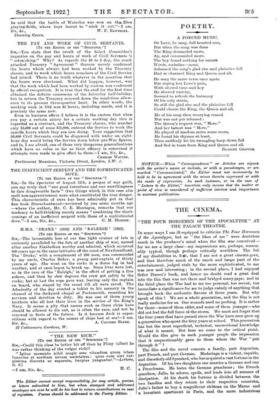THE PAY AND WORK OF CIVIL SERVANTS. [To THE EDITOR
OF THE " SPECTATOR.")
Sir.,—You state that the result of the Select Committee's inquiries on the pay and hours of work of Civil Servants is " astonishing." Why? As regards the 10 to 5 day, the much attacked Treasury " Agreement " thereon merely confirmed the hours which always had been worked by the Treasury classes, and to work which hours members of the Civil Service had joined. There is no truth whatever in the assertion that the hours were shortened. What did happen, however, was that the week which had been worked by custom was confirmed by official recognition. It is true that the staff for the first time obtained the definite concession of the Saturday half-holiday, but in return the Treasury screwed down the meal-time allow- ance to its present three-quarter hour. In other words, the working week in 1914 was 42 hours, including meals, and it is precisely the same now.
Even in business offices I believe it is the custom that when you pay a certain salary for a certain working day this is regarded as a contract, and the Treasury classes, who number only 35,000 out of some 315,000, entered the Service to work the specific hours which they are now doing. Your suggestion that 50,000 Civil Servants could be dispensed with under an eight- hour day would bring the Service down below pre-War figures, and is, I am afraid, one of those very dangerous generalizations which have no value so far as their efficacy is concerned if attempts were made to give effect to them.—I am, Sir, &c.,
CHARLES WATNEY.
Parliament Mansions, Victoria Street, London, S.W. 1.


































 Previous page
Previous page